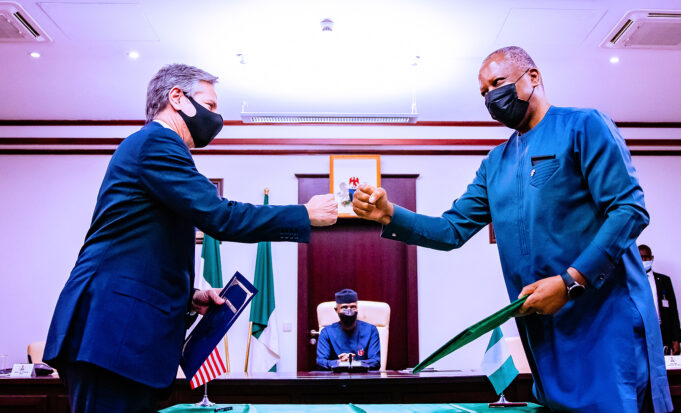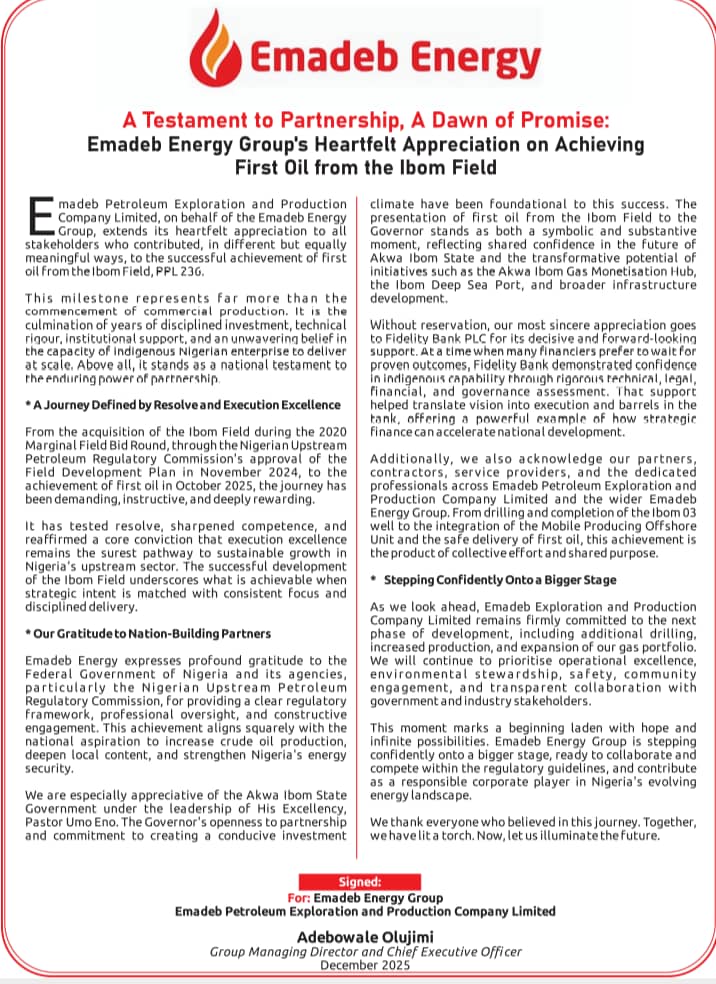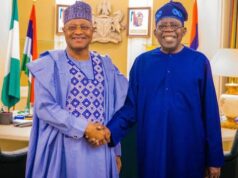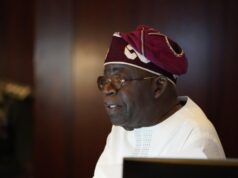The Governments of the United States and Nigeria will this week sign a $2.17 billion Development Objective Assistance Agreement.
U.S. Secretary Antony J. Blinken, who is expected in Nigeria today and tomorrow, November 18-19, will celebrate the signing of the $2.17 billion Development Objective Assistance Agreement with Vice President Yemi Osinbajo.
The agreement will play a major role in supporting a healthier, more educated, prosperous, stable, and resilient Nigeria.
During the visit to Nigeria, Blinken is expected to meet with President Muhammadu Buhari, Vice President Osinbajo, Foreign Minister Geoffrey Onyeama, and representatives from civil society.
His discussion will centre on furthering cooperation on global health security, expanding energy access and economic growth, and revitalizing democracy. The Secretary will also deliver a speech on U.S.-Africa policy.
The United States and Nigeria have collaborated closely to combat the COVID-19 pandemic. More than 60 interagency members from the U.S. Mission worked side-by-side with Nigerian counterparts, including on the COVID-19 Presidential Task Force, to plan and respond to the pandemic.
In partnership with COVAX or bilaterally, the United States has provided more than seven and a half million doses of COVID-19 vaccines to Nigeria and provided more than $119 million in COVID-19-related health and humanitarian assistance. This includes a 40-bed mobile field hospital; support for ventilators and personal protective equipment; technical assistance with vaccine readiness; conducting epidemiological COVID-19 detection and vaccine hesitancy surveys; setting up electronic record systems; providing rapid response teams; training over 200,000 military and civilian personnel on COVID-19 control measures; developing and disseminating targeted education and prevention information through multiple channels; and transferring technology for virtual training.
In addition, the U.S. Centers for Disease Control and Prevention helped establish a network of 153 COVID-19 testing labs nationwide.
According to a statement sent to The Star by the U.S. Department of State, ongoing U.S. health programmes reach more than 66 million Nigerians with lifesaving services, including by training public health workers and improving access to quality medicines, vaccines, medical facilities, and reproductive health materials.
The President’s Emergency Plan for AIDS Relief (PEPFAR) has worked with the Government of Nigeria since 2004 to provide HIV care and treatment services, propelling Nigeria toward epidemic control within the next two years. As of June 30, 2021, more than 1.6 million Nigerians are receiving PEPFAR-supported HIV treatment as a result of a historic surge that placed 350,000 new patients on lifesaving antiretrovirals, even during the COVID-19 pandemic.
Since 1997, the United States has supported polio surveillance and polio vaccination campaigns that reached nearly all of Nigeria’s 33 million children under five years of age, contributing to Nigeria’s certification as wild polio-virus free in 2020.
Since 2011, the President’s Malaria Initiative has procured almost 67 million insecticide-treated nets, 62 million rapid diagnostic test kits, 129 million treatment courses for malaria, and 22 million doses of malaria prophylaxis suitable for pregnant women, as part of over $712 million contributed to malaria control in Nigeria.
Nigeria is the second-largest trading partner of the U.S. in Africa with two-way trade between the nations totalling over $10 billion in 2019.
The U.S. Department of State says as at today, there are more than 500,000 Nigerian-born American citizens and lawful permanent residents in the United States. With more than 100,000 travellers to the United States each year, Nigerians boost American businesses, colleges, and universities.
Nigeria sends more students to U.S. colleges and universities than any other country in Africa and is the 11th largest source country worldwide of international students to the United States.
In the 2019-2020 academic year, a record-breaking number of nearly 14,000 Nigerians pursued U.S. graduate and undergraduate degrees. In 2020, advisees of EducationUSA services received scholarships worth $28 million.
Since 2015, the United States has provided more than nine million teacher’s guides and books in five of Nigeria’s most widely spoken languages to advance early grade reading; mainstreamed 340,000 out of school youth; trained 10,000 teachers; and reached more than one million students with improved reading skills instruction.
On democracy and human rights, the U.S. government continues to work to help strengthen democratic institutions and processes in Nigeria, including support for peaceful, free and fair elections.
The United States is the largest humanitarian donor in response to the crisis in the North-East, providing more than $2.1 billion since 2015 and supporting two million conflict-affected households.
“With more than $364 million in funding in 2021, the United States continues to support life-saving assistance to vulnerable populations, including internally displaced persons, refugees, and food-insecure households,” the Department said.
Since 2017, U.S. security assistance to Nigeria has totalled approximately $650 million, in addition to $500 million in Foreign Military Sales. Nigeria also has the largest International Military-Education and Training programme in Sub-Saharan Africa.
- UK announces new visa rules for health workers, students - March 13, 2025
- US election: World leaders congratulate Trump, pledge collaboration - November 6, 2024
- Japa: Nigerian student in UK slumps, dies at workplace - October 11, 2024










